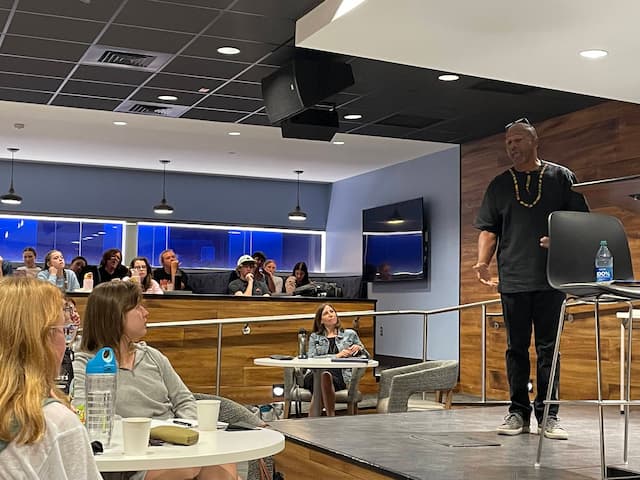
One day, poet and professor Frank X Walker asked one of his classes to name significant assassinations in the civil rights era. None of them mentioned Medgar Evers, the famous civil rights activist and first field secretary for the NAACP in Mississippi, to be shot and killed outside his home. Walker thought this almost criminal. How could one of the pioneers of the civil rights movement be forgotten? It was the main reason he began the BACHE Visiting Writers Series at Samford on Monday, Sept. 11, at Harry's Coffeehouse, with audio featuring radio news clippings detailing the tragedy before he read poems from his collection, Turn Me Loose: The Unghosting of Medgar Evers. He wanted students to travel back in time and realize Birmingham's role in the events leading up to his death.
Evers was instrumental in integrating the University of Mississippi in the fall of 1962, garnering nationwide attention and animosity towards him among white segregationists. Months later, in the summer of 1963, violent protests erupted after Alabama Governor George Wallace refused to admit Black students to the University of Alabama. "On June 11, Kennedy delivered an address asking Congress for a comprehensive civil rights bill and deemed the cause —for the first time—as a moral, not purely legal, issue." Less than four hours later, Evers, the man responsible for starting the integration conversation in Alabama, was assassinated. John F. Kennedy was assassinated five months later, but this did not stop efforts for equality as the Civil Rights Bill of 1964 was signed into law.
"So many lessons can be learned from just paying attention to what has already happened," Walker said. "If you look at all the craziness happening in America, history's being forgotten. There's a lot of effort to rewrite history and that's more dangerous than anything. Because those who forget history are doomed to repeat it."
As Rene Marie's version of Dixie/Strange Fruit (2001) can be heard in the background of the radio news clips, this set the stage for Walker's first poem, Ambiguity Over the Confederate Flag. Marie sang, "Old times being forgotten, look away, look away." Walker pointed out that this poem acknowledges slavery as an integral yet horrific part of American history, just like many Southerners emphasize the significance of the Confederate Flag.
Walker said, "The goal is for people not to feel guilty about things they know happened. But if we keep forgetting, it will be easier to recreate some of the heinous events that happened in our past. There is no danger in knowing what happened - part of why I love history is the most valuable lessons are behind us. We can avoid making mistakes if we remember our history."
The reading continued with several poems from the perspective of Medgar Evers's killer, Byron De La Beckwith, and his wife, Thelma Lindsay Neff, Evers's wife, Myrlie, and even the bullet responsible for ending his life.
Claudia Elliott, a Samford freshman studying sociology and psychology said, "I think it's beautiful how he chooses different objects and people to tell a story, how he puts himself in that place and how much research he does to ensure he's portraying that person."
English and secondary education sophomore Calin Cox commended Walker for his bravery in tackling sensitive topics with such conviction.
"I found his poetry striking," he said. "He wasn't afraid to tackle topics and have conversations that I wasn't necessarily expecting the room to have. He didn't shy away from what he wanted to say, which meant a lot to me."
"I recognize it's necessary (these conversations)," Walker said. "When it happens, most people appreciate having been there. A full poetry reading can remind you of how alive you are, and I always want that to happen."
The conversations only deepened as Walker shared poems from his collection, Masked Man, Black Pandemic & Protest Poems, chronicling his life during the coronavirus pandemic and his reaction to headlines, such as the murder of George Floyd and the lack of protections for essential workers at meatpacking plants. He also shared the last moments with his father battling cancer in his Last Will, Last Testament poetry collection.
"There was a lot of energy in the room tonight," Walker said. “It's hard to stop when you have a willing audience - If students attended with negative preconceived notions concerning poetry, I hope they left with a higher opinion of it and what it can do. Even if they are familiar with poetry, they can appreciate how much more powerful it can be in the right reader's hands."
While Cox's writing tends to be more lighthearted, he believes Walker's style of poetry is something the world needs right now.
He said, "Art is a vehicle for social conversation and the kinds of conversations that Frank X Walker wants to have are important."
Walker is the first African American writer to be named Kentucky Poet Laureate. He has published eleven poetry collections, including "Turn Me Loose: The Unghosting of Medgar Evers," which was awarded the 2014 NAACP Image Award for Poetry and the Black Caucus American Library Association Honor Award for Poetry. He is also an English, African American and Africana studies professor at the University of Kentucky in Lexington.
Learn more about Frank X Walker and BACHE.
